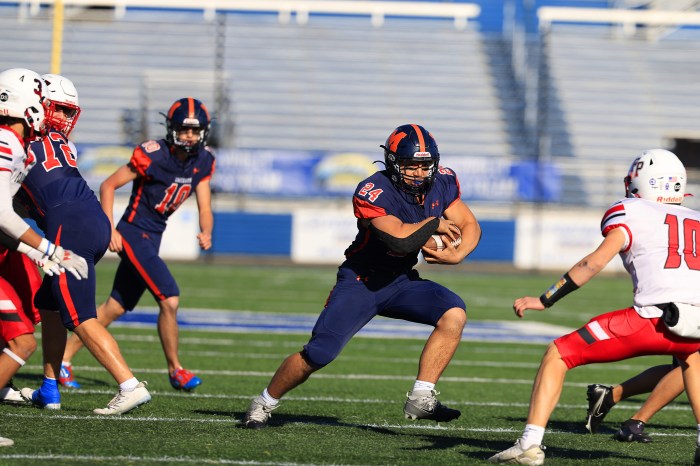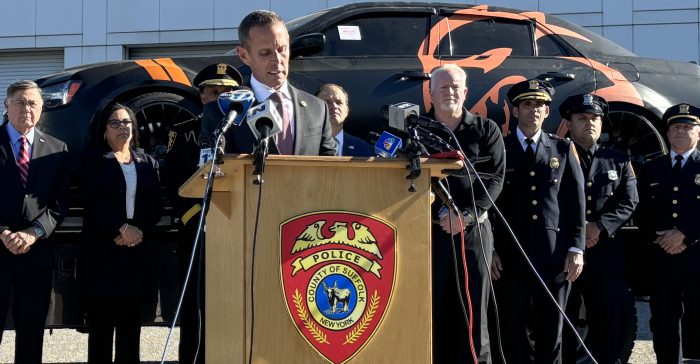Barbara Wilson Recalls Sinking of SS Athenia
Barbara Rodman Wilson can still remember each detail from the most harrowing experience of her life nearly 70 years ago, including what the dinner was that night and the exact time it happened.
Wilson, a lifelong Garden City resident who was among 21 honorees at the Women of Distinction awards ceremony last Saturday at the Merrick Library, was one of the last survivors of the infamous torpedoing and sinking of the SS Athenia on the first day of World War II. Her story drew a standing ovation from the packed audience that afternoon.
“It was just so exciting because it brought back a lot of memories and how fortunate I was to survive a thing like that,” she said. “I never thought for a moment that I would live.”
On Sept. 3, 1939, Wilson, a third-class passenger on the ocean liner en route to Montreal, fell ill because of the rough seas that day and headed for her cabin. But a stewardess came down moments later and suggested she try to make it to the dining room, where a chicken dinner was being served. Wilson heeded that advice and moments later, her cabin was among the section of the ship that was blown up by the U-boat.
“In the dining room, I had trouble with my watch,” Wilson said. “So I took it off and had it in my hands when the explosion took place. That’s why I knew it was 7:30 p.m.”
Wilson dashed to a staircase she saw in the distance, stepping over people who were either injured or dying. When she finally reached the deck, some of the lifeboats containing other passengers were already being lowered.
“I started down the ladder and there were quite a few people in the ocean,” she said. “But the ladder was twisted and a male passenger who was above me was stepping on my hands. But somehow I managed to jump from there to another rope that was being thrown and I made it. I was always pretty athletic.”
Her lifeboat tossed all night because of the rough seas. Early the next morning, a Norwegian ocean liner called the Knute Nelson found them and attempted to rescue the group.
“We were on the wrong side to be rescued,” she said. “So we tried to get the row boat in the direction of the waves. Actually we had to keep taking off articles of clothing to put in the hole where the (lost) plug was.”
Some of the other passengers weren’t as trusting.
“(They) said to be quiet because it was probably a German ship,” she recalled. “At that point, I don’t think I cared what I was on if I could be rescued. I never thought I would make it. But (the ship) went away from us and lost sight of us, kept on drifting.”
Later that morning, a British destroyer escort headed right toward the lifeboat and another rescue was attempted.
“There was no way we could avoid it,” she said. “There was a female passenger in the lifeboat. She was an old lady, probably about 60 years old and she tried to get up the rope ladder, but she was straggling and they had to pull her back into the lifeboat, broke her leg doing that. She then looked at me and said ‘You’re younger and more agile, why don’t you try.’ So I did.”
Waiting for her on deck was a uniformed officer.
“He grabbed me and pulled me bellyflop onto the deck of the ship,” she said. “And as I stood up, I said ‘Take your hands off me you dirty ‘ol German.’ He looked at me and said, ‘Would you like a spot of tea, miss?’ I was embarrassed to tears.”
The ship turned out to be a British destroyer escort, which had been picking up survivors all night. They returned to Scotland, where Wilson spent the next two weeks.
“For what reason I do not know, but I was singled out as the perfect candidate to go and spend the time we had to be there until our American government sent a ship over to bring us home.”
Now, it became a matter of letting everyone back home know she was safe. While talking to some of the other survivors in a hotel lobby, Wilson was approached by somebody who had heard her story and invited her to a local studio to broadcast a message to the United States. She eagerly accepted, hoping that her family would finally find out that she survived.
Television station NBC found out about Wilson’s message about her safety, telephoned her family and invited them to their studios to listen to the broadcast. Her father replied by saying “Relieved you’re safe…need anything?”
The American ship eventually picked her up and brought her home.
Despite that experience, Wilson continued to serve in World War II with the Red Cross in England, France and Germany, working with Allied bomber crews shot down over Germany.
“I didn’t think about that anymore,” she said. “My fiancée was killed overseas and as soon as I knew that he was dead, I looked at my family and I said I had to go back and they thought I was completely crazy.”
The athleticism she displayed that night followed her after World War II when she became a Garden City Casino tennis champion. She also served as secretary of the Garden City Assembly Social and Dance Groups, held other business positions and employments and is currently a member of the Daughters of the American Revolution and the Colonel Aaron Ogden Chapter of Garden City on both her father’s and mother’s side.
But that fateful night in 1939 has always given Wilson a greater appreciation for the people who helped her through that ordeal and life itself.
“When people began complaining about petty things, I would look at them as though, ‘What are you complaining about?’” she said. “There’s nothing to complain about, you’re alive. What else matters?”





























